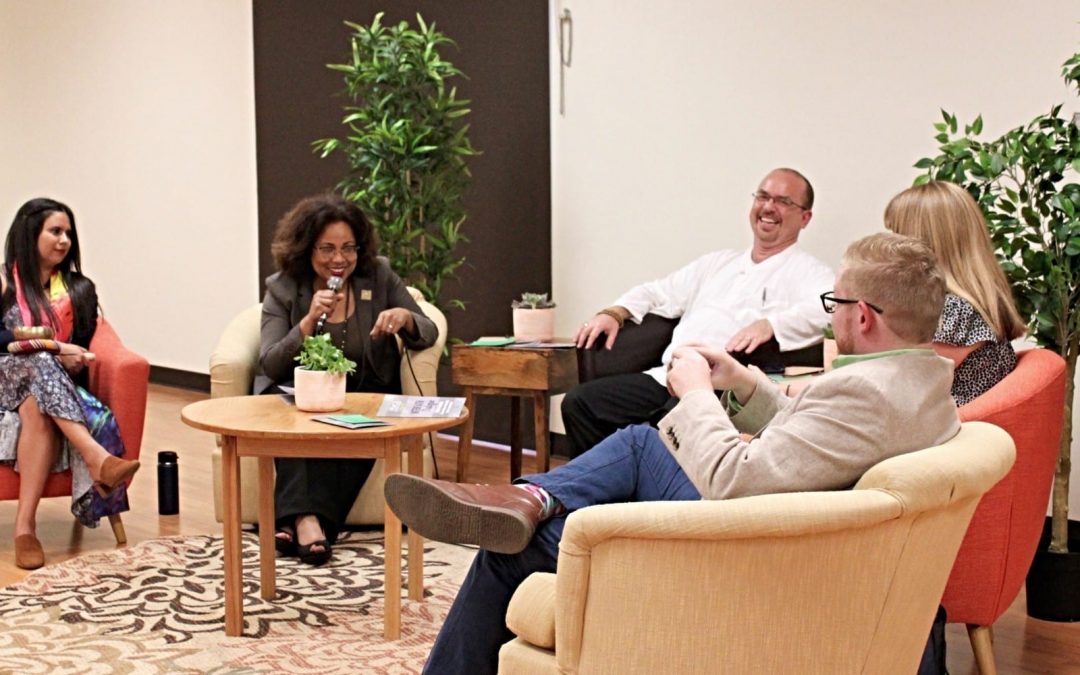Peace of Christ Church is located in Round Rock, Texas, which also happens to be one of the fastest growing counties in the country.
With this growth comes a lot of diversity; a variety of thought, culture and religious tradition thrives here.
As a result, our regular interfaith events have not only helped us grow in community as a church body, but it has also connected us to the larger society in a meaningful way.
I began coordinating these events for our church five years ago, and the lessons I’ve learned along the way have been invaluable. Here are my tips for churches hoping to plan an interfaith event in their context:
- Find interfaith partners who are passionate about the work.
Look to your congregation, neighbors and clergy friends as you seek interfaith partners in the community.
We found the bulk of our initial contacts through a congregant who worked in chaplaincy, a great space for interfaith interaction.
Over time, we have been able to create a significant contact list, including representatives from Judaism, Buddhism, Hinduism, Islam, the Baha’i Faith, Unitarian Universalism, various Christian traditions as well as many others.
These are all people of faith who are passionate about the work of breaking down barriers of fear through community with one another.
Also, don’t discount your own congregation as you seek passionate interfaith partners.
We draw from our own people to create marketing graphics, play live music, bring food and drinks, help with setup, cleanup, greeting and more.
Give your congregation opportunities to buy into the beauty of this event by offering them ways to serve and be a part of it.
- Be mindful when planning logistics.
Decide what works best for your congregation with the resources you have available.
We have hosted monthly events featuring one speaker, quarterly events with entire panels and everything in between.
When deciding on your panelists, consider the intersections that inform faith and societal paradigms.
Be intentional to seek out faith leaders who are women and people of color so a wide range of voices is represented. If it seems difficult, keep trying. They exist.
And find a neutral environment in which to host your event, where all traditions (and people who hold no faith at all) would feel welcome. We have used a community art gallery and the public library most often.
- Make your event fun.
Interfaith events are educational, which is great. But breathe some fun and energy into it by being creative in your planning.
We always have live music prior to our dialogues as well as snacks and drinks. Change up how you format each event in order to keep things interesting. Create themed events around specific subject matter.
Instead of having one lecture, break the talk up into segments with lightning rounds, buzzword rounds and other energetic formatting.
No matter what, always make sure to include an audience Q&A so people have a chance to ask their burning, albeit respectful, questions.
- Hold your plans lightly.
Something our staff likes to say is “notice the energy and go there.” We are all pastors, working on part-time pay, with young children and busy lives.
We don’t want to do one single thing that isn’t serving our people or our community well.
If it’s dead weight, we aren’t afraid to drop it or at least, reimagine it. This goes for everything, including our interfaith events.
Don’t be too settled into the same old thing and do recreate when necessary. You might begin by holding conversations to learn about other faiths, but at some point, you will want to go deeper.
We started simple and over time began exploring everything from religious liberty to racism in an interfaith context.
If you want your plans to succeed, hold them lightly and always be open to change.
- Support other interfaith events.
If you are in a small town, you may be the trailblazer of a beautiful new tradition in your community. If you live in a city, interfaith work is likely already going on. Join the work.
Find the organizations that already exist and partner with them when you can. Most important, find some to attend because interfaith work is a part of our call to love our neighbors as ourselves.
We teach our children to be kind, to share with others and to be brave. What if we adults actually practiced the same thing?
Interfaith work is a practice in these things. It is the work of radical kindness, courage and love, and we are healing society through these difficult but beautiful conversations with people who are different from us.
Editor’s note: This article is part of a series on interfaith engagement. The previous articles in the series are:
Building Interfaith Relationships Furthers Religious Liberty for All by Amanda Tyler
How to Succeed at Interfaith Dialogue: Act Like 10-Year-Olds by Terry Smith
Lead pastor of Peace of Christ Church in Round Rock, Texas, and author of A Brown Girl’s Epiphany. Follow her on Instagram @revaureliajoy where she is reimagining faith and theology via spoken and written word.


